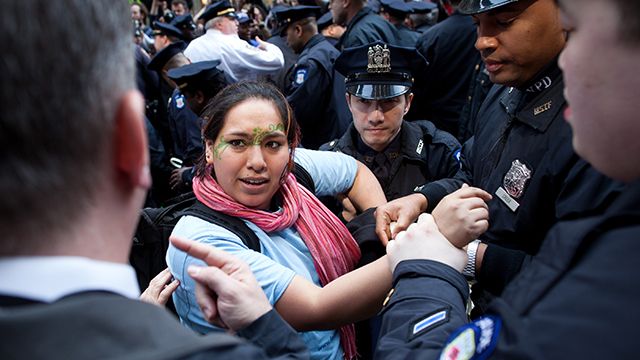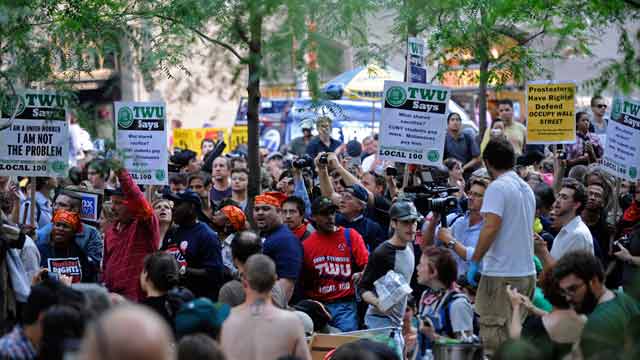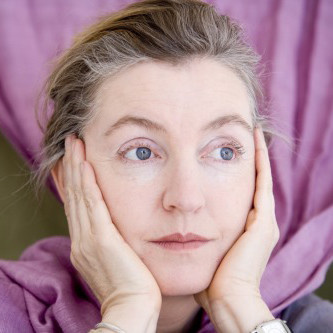This post originally appeared in Tom Dispatch. You can read Tom Engelhardt’s introduction to the post there.

I would have liked to know what the drummer hoped and what she expected. We’ll never know why she decided to take a drum to the central markets of Paris on October 5, 1789, and why, that day, the tinder was so ready to catch fire and a drumbeat was one of the sparks.
To the beat of that drum, the working women of the marketplace marched all the way to the Palace of Versailles, a dozen miles away, occupied the seat of French royal power, forced the king back to Paris, and got the French Revolution rolling. Far more than with the storming of the Bastille almost three months earlier, it was then that the revolution was really launched — though both were mysterious moments when citizens felt impelled to act and acted together, becoming in the process that mystical body, civil society, the colossus who writes history with her feet and crumples governments with her bare hands.
She strode out of the 1985 earthquake in Mexico City during which parts of the central city collapsed, and so did the credibility and power of the Institutional Revolutionary Party, the PRI that had ruled Mexico for 70 years. She woke up almost three years ago in North Africa, in what was called the Arab Spring, and became a succession of revolutions and revolts still unfolding across the region.
Such transformative moments have happened in many times and many places — sometimes as celebratory revolution, sometimes as terrible calamity, sometimes as both, and they are sometimes reenacted as festivals and carnivals. In these moments, the old order is shattered, governments and elites tremble, and in that rupture civil society is born — or reborn.
In the new space that appears, however briefly, the old rules no longer apply. New rules may be written or a counterrevolution may be launched to take back the city or the society, but the moment that counts, the moment never to forget, is the one where civil society is its own rule, taking care of the needy, discussing what is necessary and desirable, improvising the terms of an ideal society for a day, a month, the 10-week duration of the Paris Commune of 1871, or the several weeks’ encampment and several-month aftermath of Occupy Oakland, proudly proclaimed on banners as the Oakland Commune.
Weighing the Meaning
Those who doubt that these moments matter should note how terrified the authorities and elites are when they erupt. That fear is a sign of their recognition that real power doesn’t only lie with them. (Sometimes your enemies know what your friends can’t believe.) That’s why the New York Police Department maintained a massive presence at Occupy Wall Street’s encampment and spent millions of dollars on punishing the participants (and hundreds of thousands, maybe millions more, in police brutality payouts for all the clubbing and pepper-gassing of unarmed idealists, as well as $47,000 for the destruction of the OWS library, because in situations like these a library is a threat, too).
It’s important to ask not only what those moments produced in the long run but what they were in their heyday. If people find themselves living in a world in which some hopes are realized, some joys are incandescent, and some boundaries between individuals and groups are lowered, even for an hour or a day or — in the case of Occupy Wall Street — several months, that matters.
The old left imagined that victory would, when it came, be total and permanent, which is practically the same as saying that victory was and is impossible and will never come. It is, in fact, more than possible. It is something that participants have tasted many times and that we carry with us in many ways, however flawed and fleeting. We regularly taste failure, too. Most of the time, the two come mixed and mingled. And every now and then, the possibilities explode.
In these moments of rupture, people find themselves members of a “we” that did not until then exist, at least not as an entity with agency and identity and potency. New possibilities suddenly emerge, or that old dream of a just society reemerges and — at least for a little while — shines.
Utopia is sometimes the goal. It’s often embedded in the insurrectionary moment itself, and it’s a hard moment to explain, since it usually involves hardscrabble ways of living, squabbles, and eventually disillusionment and factionalism, but also more ethereal things: the discovery of personal and collective power, the realization of dreams, the birth of bigger dreams, a sense of connection that is as emotional as it is political, and lives that change and do not revert to older ways even when the glory subsides.

Members of Local 100 of the Transport Workers enter Zuccotti Park in support of the Wall Street protestors, Friday, Sept. 30, 2011, in New York. The "Occupy Wall Street" protest is in its second week, as demonstrators speak out against corporate greed and social inequality. (AP Photo/Louis Lanzano)
Sometimes the earth closes over this moment and it has no obvious consequences; sometimes it’s the Velvet Revolution and the fall of the Berlin Wall and all those glorious insurrections in the East Bloc in 1989, and empires crumble and ideologies drop away like shackles unlocked. Occupy was such a moment, and one so new that its effects and consequences are hard to measure.
I have often heard that Freedom Summer in Mississippi registered some voters and built some alliances in 1964, but that its lasting (if almost impossible to measure) impact, was on the young participants themselves. They were galvanized into a feeling of power, of commitment, of mission that seems to have changed many of them and stayed with them as they went on to do a thousand different things that mattered, as they helped build the antiauthoritarian revolution that has been slowly unfolding, here and elsewhere, over the last half century or so. By such standards, when it comes to judging the effects of Occupy, it’s far too soon to tell — and as with so many moments and movements, we may never fully know.
Preludes and Aftermaths
If aftermaths are hard to measure, preludes are often even more elusive. One of the special strengths of Thank You, Anarchy, Nathan Schneider’s new book about Occupy Wall Street, is its account of the many people who prepared the fire that burst into flame on September 17, 2011, in lower Manhattan, and that still gives light and heat to many of us.
Early in Thank You, Anarchy, Schneider cites a participant, Mike Andrews, talking about how that key tool of Occupy, the General Assembly, with its emphasis on egalitarian participation and consensus decision-making, was reshaping him and the way he looked at the world: “It pushes you toward being more respectful of the people there. Even after General Assembly ends I find myself being very attentive in situations where I’m not normally so attentive. So if I go get some food after General Assembly, I find myself being very polite to the person I’m ordering from, and listening if they talk back to me.”
This kind of tiny personal change can undoubtedly be multiplied by the hundreds of thousands, given the number of Occupy participants globally. But the movement had quantifiable consequences, too.
Almost as soon as Occupy Wall Street appeared in the fall of 2011, it was clear that the national conversation had changed, that the brutality and obscenity of Wall Street was suddenly being openly discussed, that the suffering of ordinary people crushed by the burden of medical, housing or college debt was coming out of the shadows, that the Occupy encampments had become places where people could testify about the destruction of their hopes and lives. California passed a homeowner’s bill of rights to curtail the viciousness of the banks, and in late 2012 Strike Debt emerged as an Occupy offshoot to address indebtedness in creative and subversive ways. Student debt suddenly became (and remains) a topic of national discussion, and proposals for student loan reform began to gain traction. Invisible suffering had been made visible.
Change often happens by making the brutality of the status quo visible and so intolerable. The situation everybody has been living in is suddenly described in a new way by a previously silenced or impacted constituency, or with new eloquence, or because our ideas of what is humane and decent evolve, or a combination of all three. Thus did slavery become intolerable to ever more free people before the Civil War. Thus did the rights of many groups in this country — women, people of color, queer people, disabled people — grow exponentially. Thus did marriage stop being an exclusive privilege of heterosexuality, and earlier, a hierarchical relationship between a dominant husband and a submissive wife.
When the Silent Speak
Occupy Wall Street allowed those silenced by shame, invisibility or lack of interest from the media to speak up. As a result, the realities behind our particular economic game came to be described more accurately; so much so that the media and politicians had to change their language a little to adjust to — admit to — a series of previously ignored ugly realities. This, in turn, had consequences, even if they weren’t always measurable or sometimes even immediately detectable.
Though Occupy was never primarily about electoral politics, it was nonetheless a significant part of the conversation that got Elizabeth Warren elected senator and a few other politicians doing good things in the cesspit of the capital. As Occupy was, in part, sparked by the vision of the Arab Spring, so its mood of upheaval and outrage might have helped spark Idle No More, the dynamic Native peoples’ movement. Idle No More has already become a vital part of the environmental and climate movements and, in turn, has sparked a resurgence of Native American and Native Canadian activism.
Part of what gave Occupy its particular beauty was the way the movement defined “we” as the 99%. That (and that contagious meme the 1%) entered our language, offering a way of imagining the world so much more inclusive than just about anything that had preceded it. And what an inclusive movement it was: the usual young white suspects, from really privileged to really desperate, but also a range of participants from World War II to Iraq War veterans to former Black Panthers, from libertarians to liberals to anarchist insurrectionists, from the tenured to the homeless to hip-hop moguls and rock stars.
And there was so much brutality, too, from the young women pepper-sprayed at an early Occupy demonstration and the students infamously pepper-sprayed while sitting peacefully on the campus of the University of California, Davis, to the poet laureate Robert Hass clubbed in the ribs at the Berkeley encampment, 84-year-old Dorli Rainey assaulted by police at Occupy Seattle, and the Iraq War veteran Scott Olsen whose skull was fractured by a projectile fired by the Oakland police. And then, of course, there was the massive police presence and violent way that in a number of cities the movement’s occupiers were finally ejected from their places of “occupation.”
Such overwhelming institutional violence couldn’t have made clearer the degree to which the 1% considered Occupy a genuine threat. At the G-20 economic summit in 2011, the Russian prime minister, Dmitry Medvedev, said, “The reward system of shareholders and managers of financial institution[s] should be changed step by step. Otherwise the ‘Occupy Wall Street’ slogan will become fashionable in all developed countries.” That was the voice of fear, because the realized dreams of the 99% are guaranteed to be the 1%’s nightmares.
We’ll never know what that drummer girl in Paris was thinking, but thanks to Schneider’s meticulous and elegant book, we know what one witness-participant was thinking all through the first year of Occupy, and what it was like to be warmed for a few months by that beautiful conflagration that spread across the world, to be part of that huge body that wasn’t exactly civil society, but something akin to it, perhaps in conception even larger than it, as Occupy encampments and general assemblies spread from Auckland to Hong Kong, from Oakland to London in the fall of 2011. Some of them lasted well into 2012, and others spawned things that are still with us: coalitions and alliances and senses of possibility and frameworks for understanding what’s wrong and what could be right. It was a sea-change moment, a watershed movement, a dream realized imperfectly (because only unrealized dreams are perfect), a groundswell that remains ground on which to build.
On the second anniversary of that day in lower Manhattan when people first sat down in outrage and then stayed in dedication and solidarity and hope, remember them, remember how unpredictably the world changes, remember those doing heroic work that you might hear little or nothing about but who are all around you, remember to hope, remember to build. Remember that you are 99% likely to be one of them and take up the burden that is also an invitation to change the world and occupy your dreams.


